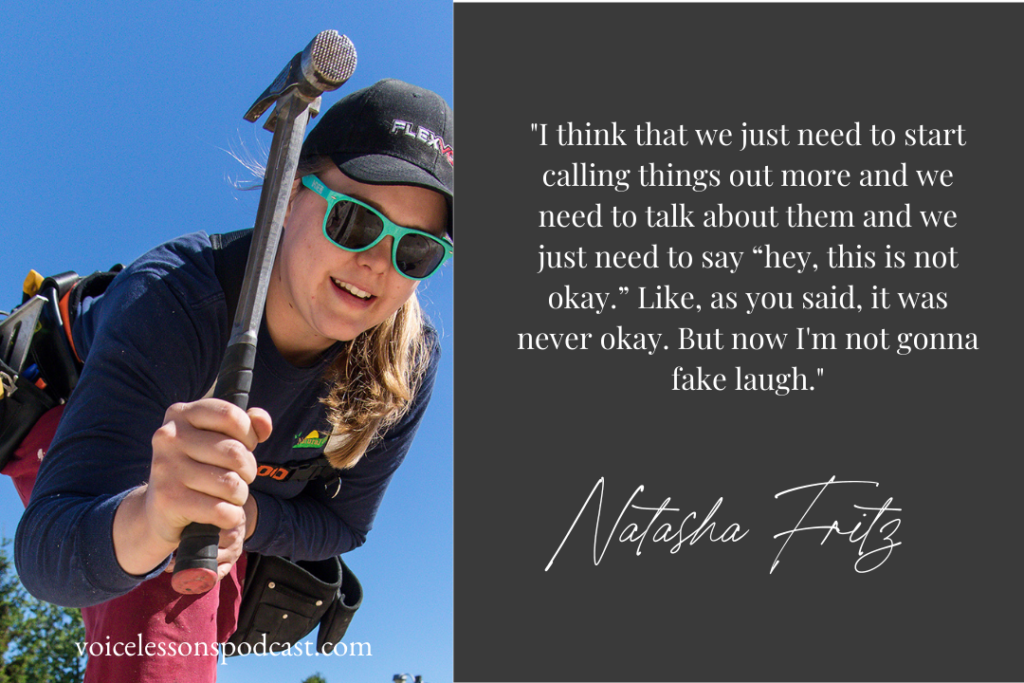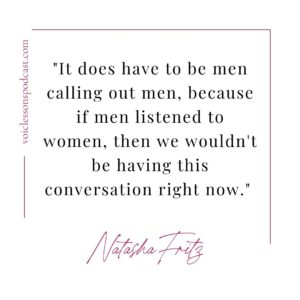A Lesson On Doing the Right Thing with Natasha Fritz
Women face misogyny at work every day but the construction industry is like the Wild West and has the second-highest rate of sexual harassment complaints in North America. Natasha Fritz experienced that harassment which is why when she heard a misogynist clip on a construction industry podcast, she decided to do something about it.
Women face misogyny at work every day but the construction industry is like the Wild West and has the second-highest rate of sexual harassment complaints in North America. Natasha Fritz experienced that harassment which is why when she heard a misogynist clip on a construction industry podcast, she decided to do something about it. In this episode, “A Lesson on Doing the Right Thing”, she shares why her choice to publicly call out the offensive remarks was the only choice.

Natasha Fritz is the owner/operator of Natural Carpentry, specializing in working with century homes in the greater Toronto area. After graduating from the two-year Heritage Carpentry and Millwork program at Algonquin College, she worked as a carpenter for 8 years before founding Natural Carpentry in 2014. Natasha has worked in many different sectors of the industry, including residential renovation; commercial construction; set carpentry for television, films, concerts, and conventions; and historical restorations. She is a contributing member of Trades Women of Instagram, an account whose main goal is to connect, empower and inspire women in male-dominated industries.
LISTEN: APPLE PODCASTS | STITCHER | SPOTIFY
TOPICS DISCUSSED IN THIS EPISODE:
- Natasha’s experience growing up as sometimes the only female in her shop classes and on her job sites.
- Feeling like an outcast in your field, just by being the only woman.
- How Natasha broke out and created her own business.
- Why the construction industry is resistant to change in areas like gender equity, technology, & sustainability.
- Natasha’s Instagram post that went viral.
- Change does not have to be risky, it’s just unfamiliar.
- Sexual harassment towards women, especially at work is still a major issue.
- **The industry with the 2nd highest rate of sexual harassment in the workforce is the construction industry.
- How Natasha found confidence in her industry to speak up for herself more.
- The double standards women face when trying to speak out when something is not right.
- The particular masculinity associated with the construction industry and the toxic work environment it unfortunately presents.
- There are corporate ways to handle sexual harassment that have not been adopted by the construction industry.
- Sexual harassment incidents need to be called out more by men.
- What language do you use when you’re in a situation that is uncomfortable?
- Why some men don’t realize the importance of breaking gender roles.
- What Natasha learned from this experience.
- The internal misogyny women face at work and how to undo the jerk reaction to accept that kind of treatment.
- Why forgiveness is key to industry shifts.
- What feminine leadership could look like in the construction industry.
RESOURCES/ADDITIONAL INFORMATION:
**Women workers put construction industry on notice: Sex harassment will not be tolerated.
Carpenter faces $15M lawsuit for criticizing sexual harassment comments in construction podcast.
America desperately needs 1 million more construction workers.
Pastor apologizes for making girls wear one-piece swimsuits in a viral post.
Sexual Harassment Resources:
U.S.
If you or someone you know has experienced sexual harassment or assault in the workplace, you can get help 24/7 by calling the National Sexual Assault Hotline at 800-656 -HOPE. As the nation’s largest anti-sexual violence organization, RAINN is also dedicated to working with organizations to better their practices related to the education about, and response to, sexual violence. Learn more at rainn.org.
If you need to file a claim for yourself or someone you know with the department of labor, you can do so online, by phone at 800-321-(OSHA), or in person at your local office listed here. Visit https://www.osha.gov/workers/file-complaint to learn more.
If you’re a company looking for additional actionable steps to reduce sexual harassment at your organization visit leanin.org/sexual-harassment. They also provide advice, information, and support for harassment survivors and for anyone who wants to help.
Canada:
You can also find international sexual assault resources from Rainn here or by calling the State Department’s emergency numbers:
U.S. & Canada 1.888.407.4747 | From Overseas +1 202.501.4444
You can find the process and resources to file a claim in your territory/province here.
#LESSONUP:
(1:20-1:39) I personally have fallen into this, you very easily, like, it’s almost like you’re actively participating in your own like upper gender oppression, you know, because your people are making jokes and you just laugh it off. Or, you know, there are certain things that you just know, well, I’m not gonna say that or talk about that because then these guys are going to be like, oh, well you’re being too sensitive or things like that. So it’s, it’s kind of like a weird balancing act, I guess you could say, because you can never just fully just like be yourself because you’re already different and you already stand out. So if you’re doing anything that, you know, wouldn’t be considered acceptable or normal to all these guys, then, then it just puts you in this weird position where you’re even more of an outcast
(2:08-2:32) There are issues that are experienced because people don’t like change because they fear their profitability will be compromised. And actually not looking to the other costs that are being incurred from a wellbeing standpoint from a world sort of cost. But the fact of the matter is, is that change doesn’t always have to be more risky. It’s just unfamiliar. And so I think this is a good moment for it.
(2:40-3:19) I don’t think harassment is exclusive to any one industry but I definitely think that in construction, it can be much more overt maybe than some other industries. I’ve been asked, are you planning to get pregnant? I have been propositioned to sleep with people while at work. I’ve had inappropriate touching or getting far closer than necessary. All sorts of comments, not necessarily sexual harassment, but definitely lots of discriminatory comments. Even just things like calling you sweetheart or princess or something like while you’re at work working.
(4:17- 4:40) I am much less tolerant of it now. I think that that is because I do feel like I am good at my job and proficient at it, and there’s no reason for anyone to discriminate against me because I know what I’m doing. And so I think that has instilled a lot of confidence in me to be able to feel like I can speak up more and speak out against it.
(4:47-5:42) I think that we just need to start calling things out more and we need to talk about them and we just need to say “hey, this is not okay.” Like, as you said, it was never okay. But now I’m not gonna fake laugh. If someone asks me, if I’m planning on becoming pregnant, I would probably respond with, “well, are you planning on impregnating anyone?” Right. Because it’s just super inappropriate. And sometimes I feel like people don’t get it until you put it in that context of, “well, what if I were to ask you this? How does that make you feel? Is that awkward? Is that weird for you? Is that maybe uncomfortable because that’s how I’m currently feeling when you say something like that to me.”
(6:14-7:03) We’re facing major labor shortages in Canada as well. And I think that one of the biggest issues, I actually think that the number one issue, there’s all these promotional campaigns going on here, saying we need to get people into the trades and all this stuff. But I actually don’t think that there’s an issue with getting people into them and to be interested in them and to want to start in them. I think the issue is long-term retention of people. People aren’t staying because it’s so difficult. It’s hard to find a good employer, an employer that’s going to pay you well, an employer that’s going to be respectful, and an employer that’s even just going to let you like leave early because you have to go to the doctor or whatever. And then, you add on top of that, this toxic work environment, it’s already hard work. It can already be unsafe or uncomfortable cause it’s dusty or you know, what other reasons, so why add this toxic attitude?
(8:42-9:06) I definitely think that it needs to be called out more and it needs to be called out, by men because that’s the only way that it’s going to change A ultimately, number one, it’s not our responsibility as women to justify our existence as equal human beings. Because that’s nobody’s responsibility.
(14:59-15:15) I think that all forms of leadership could use a bit more empathy. I know that empathy is something that’s predominantly associated with feminine qualities, but I think everybody could use a little bit more empathy in their lives. It’s important to try to consider other people and how are your actions going to impact them? You know, what are your values like are your values only about yourself? There’s nothing wrong with being about yourself. I mean, ultimately we all are right, but you know, you need to be conscientious of other people. The way that I try to look at it is I always try to think of when I was in a non-leadership role. What were things that other people who were leaders at that time, what did they do that I greatly disliked, I’m going to not do those things.
The response was shocking. Um, like really overwhelmingly. It was very overwhelming, the amount of response that I got, emails, text messages, DMS. I didn’t even really realize how far the story had gotten. I’m still like learning about how far the story has gone. There have been good things about it. Obviously we’re here, we’re talking, we’re doing this podcast. It started a conversation. The conversation’s continuing, it’s a conversation that needs to be ongoing in the world, really. Not just in this industry, but it is important, especially if we want to improve the industry and we want to minimize this labor shortage. We need to improve the overall culture of the industry because it’s not good. And anyone who doesn’t see problems with it is just lying to themselves because it’s super problematic.
Pin It:


Right on